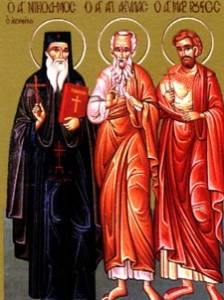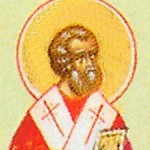 On July 14 we remember two saints, one who lived during the first years of the Christian Church and the other who lived just a few hundred years ago. They are the apostle Aquila from among the Seventy, and Saint Nicodemus the Hagiorite.
On July 14 we remember two saints, one who lived during the first years of the Christian Church and the other who lived just a few hundred years ago. They are the apostle Aquila from among the Seventy, and Saint Nicodemus the Hagiorite.
Aquila and his wife Priscilla, were friends and co-workers of Saint Paul. All three were born into Judaism, became Christians, and taught the faith to others.
In Romans 16:3 Paul writes that Aquila and Priscilla “risked their own necks for my life.” It isn’t clear what he is specifically referring to, but obviously the couple acted bravely at some time when their courage saved Paul’s life.
Paul then writes that not only he, but “all the churches of the Gentiles” are thankful to the pair, who offered their home for Christians to meet in. This was another way in which Aquila and Priscilla gave the best they had so that the Church could flourish and its great leaders could continue to teach. According to tradition, Aquila gave his very life, killed by jealous pagans.
Saint Nicodemus the Hagiorite (which means “of the Holy Mountain,” referring to Mount Athos) was born in 1748. He became a monastic on that mountain when he was twenty-six. For the rest of his life, he would work at writing and editing some of the most important books and texts we have in the Church. He prepared himself well for this work, using his prodigious memory to learn by heart the Scriptures and many writings of the Fathers, and bringing his knowledge of Greek to a level of near perfection.
The work began when he was assigned, along with Saint Macarius of Corinth, to edit a manuscript of the “Philokalia,” a collection of spiritual writings of Fathers from the fourth to fifteenth centuries. The two monks chose the contents of the book based on their availability. They included pieces that had never been published and were not accessible anywhere else. Some pieces had appeared in other publications, but these were worm-eaten, crumbling texts that were nearly impossible to read.
Saint Nicodemus’ preface to the “Philokalia” emphasizes that the book is meant to inspire all Christians, not just monastics. He was always eager to share good Christian teaching from any source. For example, he produced an edition of “Unseen Warfare” by Father Lorenzo Scupoli, a Roman Catholic.
During the remaining years of his life Saint Nectarios continued to work intensity. He wrote hymns, a book on Christian morality, a manual for confession and accounts of the lives of saints. He produced a new edition of the “Rudder” and translated a three-volume work on the Pauline epistles by Saint Theophylact.
Exhausted and ill, he died at the age of sixty, having given the best of his great learning and energy to the service of the Church. He left encouraging words for every Christian: “…the more a man acts in accordance with the commandments of Christ, the more he is cleansed of the passions and the more the fire of Divine grace lights in his heart, illumines and deifies him.”

